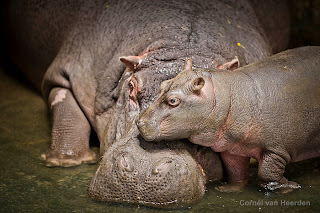To me there was only one
thing better than photographing David Goldblatt and that was meeting him.
Mister Goldblatt, regarded
by me and many others as the “Father of South African photography”, comes from
Randfontein and went to school in Krugersdorp – where I also grew up and went
to school. In Randfontein he worked in his father’s shop and started with
photography in 1948. That gives him 63 years’ experience. Wow!
To photographers, it’s a very
daunting task to photograph ‘one of your own’ – mainly because every
photographer is different and our work is very visual. So you are very
self-conscious and constantly get the feeling that you are being judged.
Because I respect and admire
Mister Goldblatt so much, I said to myself that if I don’t come away with a
‘iconic image’ I would regard it as a failure and if I must be honest, I don’t
think I achieved it and failed in creating an ‘iconic image’.
After the shoot we were busy
packing up when Mister Goldblatt asked us if we wanted to sit. We started
talking and just kept on talking. In the end we probably talked for as long as
we were shooting. Politics. Religion. Afrikaners. Africans. Photography
projects. Apartheid. Digital. South
Africa South Africa
David Goldblatt's letter to the President when he declined the Order of the Ikhamanga:
“Dear Mr. President,
On March 29 2011 I was informed by the Chancellor of Orders that I had been awarded the Order of Ikhamanga Silver, which I accepted with gratitude and in humble awareness of the honour that had been bestowed on me. I was not able to attend the ceremony of presentation on April 27. However, I was informed that the award would be presented to me on April 27 2012.
I profoundly regret to inform you that I now decline the award. I do this for two reasons.
Firstly in protest against the Protection of State Information Bill that was passed in Parliament on Tuesday 23 November. The damage done to our democracy by the very passing of this Bill, and the damage that is likely to ensue should you sign it into law, has been emphatically and eloquently stated by others and I will not attempt to describe it here. Suffice to say that this action severely undermines our brave but fragile democracy and the rule of law.
Secondly, I decline the award in protest against what has been done to the spirit in which the award was created. I quote from the official history of our National Orders:
South Africa South Africa
One of the symbolic moments of the exodus from the past was the raising of the new flag in 1994. This moment aptly affirmed the pride and dignity of an unfolding country and a celebration of humanity. Another was the unveiling of a new Coat of Arms on 27 April 2000 that embraced the collective historical essence of the people of the country. In so doing, a new aesthetic that takes consideration ofAfrica and her symbols became
part of the new culture that informs a South African rebirth.
“Dear Mr. President,
On March 29 2011 I was informed by the Chancellor of Orders that I had been awarded the Order of Ikhamanga Silver, which I accepted with gratitude and in humble awareness of the honour that had been bestowed on me. I was not able to attend the ceremony of presentation on April 27. However, I was informed that the award would be presented to me on April 27 2012.
I profoundly regret to inform you that I now decline the award. I do this for two reasons.
Firstly in protest against the Protection of State Information Bill that was passed in Parliament on Tuesday 23 November. The damage done to our democracy by the very passing of this Bill, and the damage that is likely to ensue should you sign it into law, has been emphatically and eloquently stated by others and I will not attempt to describe it here. Suffice to say that this action severely undermines our brave but fragile democracy and the rule of law.
Secondly, I decline the award in protest against what has been done to the spirit in which the award was created. I quote from the official history of our National Orders:
One of the symbolic moments of the exodus from the past was the raising of the new flag in 1994. This moment aptly affirmed the pride and dignity of an unfolding country and a celebration of humanity. Another was the unveiling of a new Coat of Arms on 27 April 2000 that embraced the collective historical essence of the people of the country. In so doing, a new aesthetic that takes consideration of
The new National Orders have been conceived in the spirit of that rebirth.
I submit Mr President that you, your Government and the party that passed this Bill are in contempt of that spirit. The Bill itself, the manner in which it was pushed through Parliament in the face of clear rejection by substantial numbers of people and respected organs of civil society and, if it is signed by you, the existence of such legislation in our law, are the very antithesis of the spirit in which our National Awards were conceived.
To accept the Order of Ikhamanga from you on April 27 would be to endorse your contempt. I refuse to do that and, very sadly, I decline the honour.
David Goldblatt”
Behind the scenes photos by Nelius Rademan. He also assisted me with the shoot.






























































